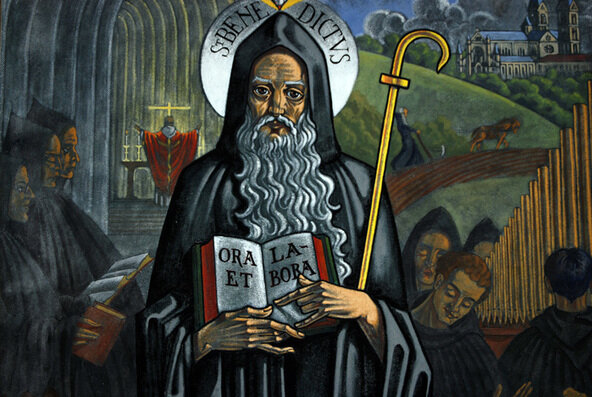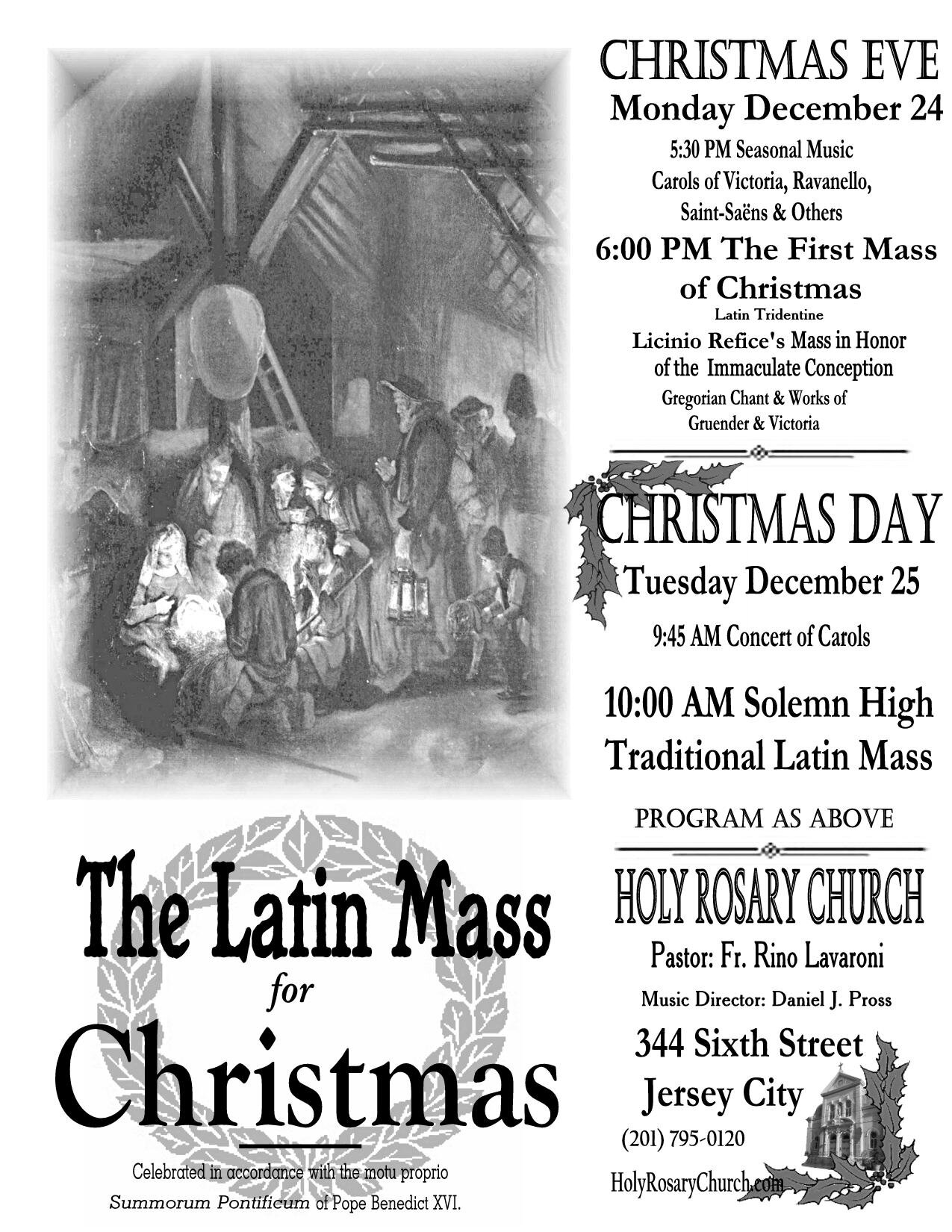The Long View 2007-12-06: Progress after Modernity; Islam & Atheism; Secular Latin; Latin Mass Poster

Waiting for a new, and doubtless very different, St. Benedict
Things have been quiet around the blog recently. Hopefully, things will pick up soon, and we can cruise into John J. Reilly’s 2008.
Progress after Modernity; Islam & Atheism; Secular Latin; Latin Mass Poster
Persons interested in the end of modernity should note this remark by G. K. Chesterton in A Short History of England (1917) about the Roman world of the fifth century AD:
In our time there has come a quarrel between faith and hope--which perhaps must be healed by charity. But they were situated otherwise. They hoped--but it may be said that they hoped for yesterday. All the motives that make a man a progressive now made a man a conservative then. The more he could keep of the past the more he had a fair law and a free state; the more he gave way to the future the more he must endure of ignorance and privilege. All we call reason was one with all we call reaction.
We are half a millennium from any such state. I think, though, that we can already imagine a situation in which "progress" means the difficult but successful maintenance of a satisfactory world rather than the creation of a novel one.
* * *
Is there a deep harmony between Islam and atheism? That Spengler at Asia Times thinks so:
Millions of Muslims reportedly convert to Christianity each year, mainly in Africa. Islam is stagnant in Asia while tens of millions become Christian. Yet all the Muslim apostates whose voices we hear are atheists - ...It is easy to change what we think, but very hard to change how we think. Contrary to superficial impressions, Islam is much closer in character to atheism than to Christianity or Judaism. ...Secular liberalism, the official ideology of almost all the nations of Western Europe, offers hedonism, sexual license, anomie, demoralization and gradual depopulation. Muslims do not want this....By contrast, there is indeed a war with Islam, and it is being won in parts of the world where Christians wage it on spiritual grounds. No Christian army has had to march in its support. Europe, meanwhile, is losing ground to Islam because it declines to fight.The pressing question is why Muslim apostates cling to the secular liberalism that has failed so thoroughly in Western Europe. The trouble is that old habits of mind die slowly. That is not only true of Muslims. The sort of Eastern European Jews who hailed the false messiahs of the 17th century, for example, were attracted to the messianism of Karl Marx....Allah, as I have argued in this venue elsewhere, is a very different. sort of god than YHWH and Jesus. ...That notion of a god who accepts no limitation, not even the limit of laws of nature that he created, characterizes mainstream Muslim thought since the 11th century. ...As Rosenzweig observes, "An atheist can say, 'There is no God but God'." If God is everywhere and in all things, he is nowhere and in nothing. If there are no natural laws, there need be no law-giver, and the world is an arbitrary and desolate place...It is not surprising that Islamic science died out a generation or two after al-Ghazali....The empty and arbitrary world of atheism is far closer to the Muslim universe than the Biblical world, in which God orders the world out of love for humankind...
Okay, but we should note that Oswald Spengler himself cautioned that atheism is always culture-specific. The Buddhism of Gautama Siddhartha was, arguably, a Hindu's idea of agnosticism. Conversely, I have heard it said that the attraction of Marxism to the Chinese of the early 20th century was not its "materialism," but the historical mysticism that had been rigorously purged from Neo-Confucianism. According to Spengler, the "atheism" of the early Islamic Civilization (a term of art in his usage) was "astral fatalism." This was closely connected with astrology. I gather that Oswald Spengler meant an abandonment of belief in the will, even in God's.
Whatever else one may say about the current crop of Muslim atheists, they seem to be earnest souls little touched by fatalism, astral or otherwise.
In this connection, I remember that a citizen of Riyadh, Saudi Arabia, gave this slightly exasperated answer to an American reporter who asked why he and his neighbors viewed the Scud missile attacks on his city during the 1990-1991 Gulf War from the roof of their high-rises:
"If we go into the shelters when the alarm sounds, then we are excitable Arabs. If we go up on the roof, then we are fatalistic Muslims. We just can't win."
* * *
A Vote for Latin is the title of an Op Ed by one Harry Mount that ran in the New York Times earlier this week. Deploring the fact that none of the current crop of presidential candidates majored in Classics at school, the author notes the advantages of studying the language. For instance:
But also, learning to translate Latin into English and vice versa is a tremendous way to train the mind. I think of translating concise, precise Latin into more expansive, discursive English as like opening up a concertina; you are allowed to inject all sorts of original thought and interpretation.
As much as opening the concertina enlarges your imagination, squeezing it shut — translating English into Latin — sharpens your prose. Because Latin is a dead language, not in a constant state of flux as living languages are, there’s no wriggle room in translating.
I think there is an advantage that can be put more succinctly: if you can pass the final exam in a first-year Latin class, then you will know English grammar. The distinction between "who" and "whom" will hold no terrors for you. You will be tempted to strangle people who say "between you and I." So, a revival of Latin would be a good thing. But look at the author's brief account of the modest revival that does seem to be underway:
In 1905, 56 percent of American high school students studied Latin. By 1977, a mere 6,000 students took the National Latin Exam.
Recently there have been signs of a revival. The number taking the National Latin Exam in 2005, for instance, shot up to 134,873.
Surely the biggest boost to Latin in recent years was Benedict XVI's reauthorization of the Tridentine Latin Mass? The widespread study of Latin collapsed in large part because it was no longer studied as a liturgical language by Catholics, not even in seminaries. The Latin Mass is not going to replace the vernacular, but it is likely to generate a modest, steady demand for the study of the language.
* * *
I have been blogging a bit less frequently lately. It's the time of year; so many projects have to be completed. For me, here is one of the less onerous, a poster for the Christmas Mass at my church:

Every component in that poster comes from the public domain. I swear.
Copyright © 2007 by John J. Reilly
Support the Long View re-posting project by downloading Brave browser, and then trying it out. With Both Hands is a verified Brave publisher, you can leave me a tip too!



Comments ()